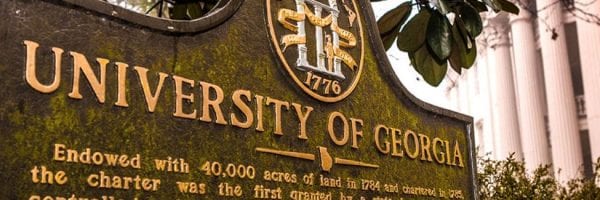New MBA Jobs: PWC, Berkshire Hathaway, Credit Suisse, and More!

MBAs can always look forward to plenty of hot job opportunities once they graduate. Here’s a look at some of this week’s best new MBA jobs at respected firms like PWC, Berkshire Hathaway, Credit Suisse, Jane Street, and Chevron. Learn more about these open positions and apply today! Continue reading…
5 Questions With University of Georgia Admissions

In the newest installment of the MetromBA “5 Questions” series, we speak with Patricia D. Zettek, Ph.D., Director of the Full-Time MBA Career Management Center at the University of Georgia Terry College of Business, and Deirdre Kane, Director of Full-Time MBA Admissions about the UGA experience, Southern culture, and more.
What is something unique about the Terry College of Business MBA experience that people may not expect?
“Candidates to our program are most often surprised by three main things:
1.) Our flexible curriculum
2.) Our personalized and customized approach to supporting our students, academically and professionally
3.) Our welcoming and diverse program culture.
We have years of experience and the strength and size of our alumni network (310,000 and counting) to support our students in being successful while in the program and after they graduate. Our career management staff knows our students well and this one-on-one attention makes a big difference by the end of the program. Students learn and practice skills they need to land their next job or internship, and also to manage their careers throughout their lives. Faculty get to know the students, and truly take an interest in their success.”
What kind of student is the ideal Terry College of Business MBA?
“We look for humility, self-awareness and the willingness to learn new things about themselves—people who have experienced a setback or two—and learned from it. The ideal candidate for the Georgia MBA program has more than just the great test scores and GPAs sought by all full-time MBA programs, we look for the students that demonstrate a roll up the sleeves and get things done attitude. These are the people who do well here.”
What do you find business school applicants often overlook during the pre-MBA process?
“I think some people limit their choices by looking only at certain things, rather than the whole picture. They may focus tightly on one factor—school rank, tuition cost, employer relationships, average salary—rather than fully thinking through what they want and need from their MBA experience. Visiting campuses, talking to current students and meeting members of the staff could offer a very different view than the one that takes into account only one or two factors. MBA programs vary widely and there is not a one-size-fits-all experience. Find a few that fit your needs and go after them.”

“We look for humility, self-awareness and the willingness to learn new things about themselves—people who have experienced a setback or two—and learned from it” – Patricia D. Zettek, Ph.D. and Deirdre Kane
What do you find most business schools are lacking?
“Lacking is a pretty strong word. I consider business school an excellent investment in a candidate’s future. I understand why you might ask though, because if you listen to the media, the MBA has been dying out since the 1940s, but that’s just not true! There continues to be a need for professionals trained to understand the complexities of our business environment and committed to doing things right. Overall MBA programs and program staff are committed to the success of their students and genuinely interested in providing their students with the best experience and the best opportunities.”
What is your favorite restaurant near UGA?
“I think Athens is one of the South’s most underrated food cities. We’re known for music and football, but not until recently have we been noticed for our food scene. Thanks to chefs like Hugh Acheson, who calls Athens home, we have many farm to table gems, like Last Resort Grill, The National, home.made, and Heirloom Café. And everyone should check out Weaver D’s, Ted’s Most Best, Clocked, The Grit, Taziki’s, and Viva Argentine! The list is long and there is something for everyone!”

Southern-inspired specialties are abound in Athens, Georgia, including at home.made, founded by New Orleans-born chef Mimi Maumus – Photo via homemadeathens.com
For more information on the UGA Terry MBA admissions, click here.
The Best MBA Internships: Midwest

The Midwest is a great place to live. Not only is it among the friendliest places in the U.S., but it’s home to some top-rated MBA programs including the University of Chicago’s Booth School of Business, Northwestern University’s Kellogg School of Management, the University of Michigan Ross School of Business, and Indiana University’s Kelly School of Business.
So, with all these great schools in the area, the question is, where should you look for your MBA internship in the Midwest?
Below, we’ve highlighted 14 of the best MBA internships spread out over the cities of Chicago, Milwaukee, Cleveland, St. Louis, and Minneapolis.

When it comes to the Midwest, Chicago is the foregone epicenter. And there’s no doubt that it’s a great city for internships with many top companies. Chicago is home to nearly 40 Fortune 500 companies while also being considered the financial and cultural hub of the area.
So, where should you look for an internship in Chicago? There are many options:
- McKinsey & Company: McKinsey is known for recruiting from a variety of Midwest schools, including Chicago Booth, Northwestern Kellogg, Indiana University Kelley, and Carnegie Mellon Tepper. In fact, last year McKinsey & Co hired 48 employees from Booth. This accounts for nearly 10 percent of the 2017 Booth MBA class.
- United Airlines: United Airlines is headquartered in Chicago, IL and has a wide variety of MBA internship opportunities available in the city. There are opportunities in marketing, financial planning and analysis, HR, legal, corporate and government affairs, and more.
- Google: For an internship with Google in the Midwest, then Chicago is where you need to be. The Google internship program has openings for students interested in business strategy, finance, hardware, people operations, product management, and more.

As the largest city in Wisconsin and the fifth largest city in the Midwest, Milwaukee is another great location for MBA internships. The city is known for manufacturing and service companies and is home to six Fortune 500 companies. In particular, the city is known for having a large number of financial service firms and health care opportunities.
In terms of internships in the city, you should keep your eye on these companies:
- U.S. Bank: An internship at U.S. Bank is a great choice if you’re looking for the opportunity to work for the fifth largest bank in the U.S. There are opportunities to intern in distributed database administration, fund services, product management, private capital management, lending services, and more.
- Northwestern Mutual: Headquartered in the city, Northwestern Mutual is home to many MBA-level internships. Students can intern in public investments, analytics, strategic sourcing, and more.
- SC Johnson: In Racine, WI, just outside of Milwaukee, MBA students can find an internship opportunity at SC Johnson. There are openings in marketing, finance, sales, research and development, manufacturing, and IT. It’s an ideal company for those interested in a career in manufacturing.

Cleveland, Ohio home to manufacturing, financial services, healthcare, and biomedical companies. Many top-rated companies call the city home including NACCO Industries, Sherwin-Williams, Applied Industrial Technologies, and KeyCorp. NASA also maintains a facility in Cleveland.
For internship opportunities in the area, look to:
- Eaton: The Eaton MBA internship program is ideal for global MBA students who are interested in the energy industry. Eaton is a $20.4 billion company with 95,000 employees around the world with MBA internships in supply chain management, human resources, and more.
- Nestle: Located in Solon, OH, just outside of Cleveland, Nestlé has an MBA internship program for students interested in marketing or brand management. Internships get the opportunity to work with the company’s global portfolio of more than 2,000 leading brands.
- KeyCorp: Headquartered in Cleveland, KeyCorp is one of the nation’s largest bank-based financial services companies with more than $134.5 billion in assets. Every year, they high MBA summer associates in investment banking

St. Louis is the cultural and economic epicenter of Missouri. As the 19th largest city in the U.S., it is considered a major economical center for service, manufacturing, trade, and tourism. The metro area is home to many major corporations including Anheuser-Busch, Boeing Defense, Energizer, Panera, Enterprise, Edward Jones, and Purina. In fact, nine Fortune 500 companies call the city home.
Top MBA internships in St. Louis include:
- Monsanto: The beleaguered Monsanto was recently acquired by Bayer to strengthen its agricultural division. The MBA internship is designed for individuals interested in digital strategy and innovation.
- Emerson: The U.S. MBA leadership program at Emerson is designed for students interested in marketing, operations, supply chain, strategy, HR, financial, or business development. Each year, the company interviews more than 400 MBA candidates to fill their roles.
- Ameren Corp: As a leader in energy, the Ameren MBA internship is ideal for candidates interested in providing new solutions to tomorrow’s energy needs. MBAs interested in environmental policy and sustainability are preferred.

Minneapolis is the larger of the Twin Cities and the 16th largest metro area in the U.S. Recognized as a global city, the economy is known for business, medicine, sports, manufacturing, and research. Five Fortune 500 companies call Minneapolis their home including Target, U.S. Bancorp, Xcel Energy, Ameriprise Financial, and Thrivent Financial.
The best MBA internships in the area include:
- Target: The Target Arrows Leadership Development Program is designed for MBA students interested in being a part of Target’s global supply chain and logistics. It’s ideal for individuals interested in operations.
- S. Bank: Headquartered in the city, U.S. Bank is home to a ten-week competitive internship for students interested in retail payment solutions, enterprise strategy, lending services, performance engineering, and more. Here’s an example of the ad for a product management intern.
New Dean Will Lead Cornell SC Johnson College of Business

Economist and labor market scholar Kevin F. Hallock has been appointed dean of the Cornell SC Johnson College of Business beginning December 15, Provost Michael Kotlikoff announced yesterday afternoon. The Cornell College of Business, formed in early 2016, integrates the Samuel Curtis Johnson Graduate School of Management, the School of Hotel Administration, and the Charles H. Dyson School of Applied Economics and Management.
An experienced administrator, Hallock has served as dean and professor in the School of Industrial and Labor Relations (ILR) since 2015. His new term as dean of the College of Business was approved by the Cornell Board of Trustees executive committee and will run through June 30, 2024. Kotlikoff said in a statement that a search for a permanent ILR School dean to replace Hallock will begin immediately and an interim dean will be named next week.
“As an accomplished economist, scholar, and administrator, Kevin provides the Cornell SC Johnson College of Business with the leadership to maximize its enormous potential,” Kotlikoff said in a statement. “His thorough familiarity with Cornell’s administrative workings is a significant asset, and the college will be well served by his deep understanding of business administration theory and practice.”
Overseeing the combined schools of the Johnson College of Business is a big job. The decision to unify the three schools under a single umbrella was reached because it promised to make a wider range of opportunities available to students while also increasing Cornell’s ability to draw top recruiters and faculty. But Founding Dean Soumitra Dutta stepped down unexpectedly in February, and L. Joseph Thomas has been serving as interim dean since he left.
Hallock Brings Record of Strong Leadership
As ILR dean, Hallock’s accomplishments were many, including guiding the school through a strategic planning process, investing in student experience and well-being, and introducing a school-wide initiative to unite students, staff, and faculty around a common theme, such as “Technology and the Evolution of Work,” which has been this year’s theme. He also brings fundraising prowess, having raised resources for new investments in IRL faculty and research, expanded human resources, and a transition of ILR’s New York City office to a new home at 570 Lexington Ave, slated to open in January 2019.

Kevin Hallock, the next dean of the Cornell SC Johnson College of Business. Photo credit: Jesse Winter Photography
“Grateful and Excited to Start This New Chapter at Cornell”
Hallock said he is “grateful and excited to start this new chapter at Cornell” but realizes he has his work cut out for him.
“The Cornell SC Johnson College of Business, in its infancy, faces challenges, like many new organizations, and those challenges are part of what attracted me to this role,” he said in a statement. “But there is also enormous opportunity, outstanding strength, and unique advantages in the college and its three schools. I am excited to work with its talented staff, students, faculty, and alumni, and I am exceptionally optimistic about the future of the college.”
The College of Business notes that it has already celebrated several milestones in its first couple of years. Applications for open faculty positions in 2017-18 increased five-fold over prior years in some areas, the school reports. Not only that, more faculty who have been offered positions have accepted them than ever before, resulting in the successful hires of 20 new faculty. Undergraduate application volume at both the Charles H. Dyson School of Applied Economics and Management and the School of Hotel Administration grew by 80 percent between 2016 and 2018. Application volume at the Johnson Graduate School of Management is down just slightly year over year, less than one percentage point. This puts Johnson ahead of many of its U.S. peer business schools, which experienced even greater declines.
An expert on executive compensation, compensation design, and labor markets, Hallock’s research has focused on the complexity of executive compensation contracts and corporate performance and been featured in academic journals including The American Economic Review, the Journal of Corporate Finance and the Journal of Financial and Quantitative Analysis. The Sloan Foundation and the U.S. Departments of Labor and Education are among many organizations that have helped to fund his research.
Long History of Involvement at Cornell
A longstanding member of the larger Cornell family, Hallock joined the faculty of ILR in 2005 and became its dean in 2015. During his tenure, he also has played an active role on several university committees, including Cornell’s Financial Policy Committee, the Provost’s Budget Model Task Force, and the Cornell Student Experience Initiative’s steering committee. In 2009, he was the founding director of Cornell’s Institute for Compensation Studies.
Outside of Cornell, he has also been active as a research associate at the National Bureau of Economic Research since 2003. And in 2013, he was elected a fellow of the National Academy of Human Resources. He has consulted and served as an expert witness on issues of compensation, executive compensation, stock price reactions to labor market events, and antitrust in labor markets.
Hallock holds a bachelor’s degree in economics summa cum laude from the University of Massachusetts, Amherst, and master’s and doctoral degrees in economics from Princeton University.
Learn more about the newly appointed dean of the Cornell SC Johnson College of Business.
This article has been edited and republished with permissions from Clear Admit.
The Five Most Valuable Online MBAs

Choosing an online MBA program isn’t easy. Not only do you need to look at rankings, but you also have to look at what the program offers and how affordable it is. After all, the goal of an online MBA is a great return on investment. So, how do you find the most valuable Online MBA programs?
We’ve searched through the U.S. News and World Report on the “Best Online MBA Programs” to find which ones can give you the best experience at the best cost.
The programs on this list rank in the top 25 “Best Online MBA Programs,” and cost under $1,400 per credit.
The Five Most Valuable Online MBA Programs
Indiana University
Tied for first as the best online MBA program in the country, Indiana University’s Kelley School of Business is also affordable.
The Kelley Direct Online program offers the ultimate in flexibility. Students can take between two to four years to graduate and tailor their classwork to their goals. Online MBA students will cover such topics as business law and ethics, economics, marketing, finance, operations, information technology, and project management. They’ll also have the opportunity to study abroad in one of Kelley’s global hubs located in Botswana, Brazil, China, India, Myanmar, South Africa, and Cuba.
- Cost: $1,330 Per Credit (out-of-state)
- Ranking: #2
Arizona State University
Ranked as the 5th best online MBA program in the U.S., Arizona State University’s W.P Carey School of Business won’t break the bank either.
The Online MBA at ASU is designed to work with students no matter where they live. The program is incredibly flexible with just five weeks per class and 17 total classes. Interested students can expect to take classes covering a range of topics including strategic management and global thinking. Classes start in either January or August with students taking the same curriculum taught by the same faculty as the full-time and part-time programs.
- Cost: $1,216 Per Credit (out-of-state)
- Ranking: #5
University of Florida
Ranked at 6th overall, the University of Florida Hough Graduate School of Business also offers an affordable online MBA program.
The UF Online MBA offers the ideal balance of work, life, and school commitments. Students can graduate in just 24 months without visiting campus, with courses taught by the full-time MBA faculty. Students cover the same topics as their full-time brethren with courses on financial accounting, economics, and more. There is also an optional Global Immersion Experience opportunity.
- Cost: $1,255 Per Credit (out-of-state)
- Ranking: #6
Lehigh University
Ranked at 19th on the U.S. News and World Report list, the online MBA at the Lehigh University’s College of Business and Economics is incredibly affordable.
The Online Flex MBA at Lehigh University is AACSB accredited and places high emphasis on maintaining excellence. Students can complete the program in as little as 16 months while taking classes on a variety of topics including managing financial and physical resources, corporate entrepreneurship, international business, and marketing. Students can also choose to pursue a concentration in one of six fields including: corporate entrepreneurship, finance, international business, marketing, project management, and supply chain management.
- Cost: $1,075 Per Credit (out-of-state)
- Ranking: #19
University of Delaware
The University of Delaware’s Lerner College offers the most affordable online MBA on our list while still ranking in the top 25.
Last but certainly not least, the Lerner Online MBA is designed to provide students with the decision-making skills and analytical tools to succeed. The program is entirely online with a customizable curriculum that can be completed in as little as 16 months. In addition, students can choose between five concentrations including business analytics, finance, healthcare, strategic leadership, and international business. Each course is seven weeks long and taught by a Ph.D.-qualified faculty member.
- Cost: $812 Per Credit (out-of-state)
- Ranking: #22
Runner’s Up
- University of Texas at Dallas: The Naveen Jindal School of Management’s Online MBA program is ranked #6 in the nation and costs $1,402 per credit (out-of-state).
- Hofstra University: The Zarb School of Business Online MBA ranks 36th on the list and costs just $1,596 per credit (out-of-state).
- Syracuse University: Ranked 42nd, the Syracuse University Online MBA costs just $1,500 per credit.
Impulses, a Culinary EMBA, and Immigration Figures – Boston News

Let’s explore some of the most interesting stories that have emerged from Boston business schools this week.
How God Influences Your Grocery Bill – Questrom School of Business Blog
BU Questrom Professor of Marketing Didem Kurt recently co-authored new research with the University of Pittsburgh’s J. Jeffrey Inman and Harvard’s Francesca Gino that explored links between “grocery sales data and rates of religious adherence in thousands of counties across the country.”
According to the study, “religion and religious messages were linked to lower spending.”
People who were reminded of God’s presence were less likely than another control group to spend money on “impulse purchases such as magazines and gum,” an effect that the researchers note “persisted whether or not an individual described themselves as religious.”
Kurt explains, “We attribute this result to the notion that thinking about God reminds people of commonly shared values—such as frugality—even if they don’t believe in God. Managers may want to consider proximity to houses of worship when choosing a retail location. They need to be cognizant of the effect of religious cues and reminders on consumer spending.”
You can read the full article here and check out the complete paper on Science Direct.
A Full-Course Meal – Sawyer Business School Blog
The Sawyer Business School Blog recently profiled David Lanci, EMBA ’02, who after many years as a chef, shifted into the food services industry and founded NexDine, which offers “catering and dining services to corporations, schools, colleges, and senior living facilities around the country.”
Lanci told the Sawyer blog that his Suffolk EMBA “gave [him] the confidence to go out and start this company. One thing I really learned from my EMBA is to take a holistic view of everything and never have a singular view. It’s not just about what’s on the plate.”

NexDine founder David Lanci, EMBA ’02
Lanci continues:
“I realized that how you communicate with the people in the group has a dramatic impact on the outcome. I realized it wasn’t just out of sheer will you could get something done. You had to collaborate, and that was the aha moment for me.”
He concludes, “Food is almost the easy part. It’s just as challenging—if not more so—to manage people, manage clients, manage budgets. And in our industry, we’re not making widgets. We can’t do everything the same way for every client. Every location is different. People’s appetites are different.”
You can read the full interview with Lanci here.
Undocumented Immigrant Population Roughly Double Current Estimate – MIT Sloan Newsroom
According to new research from MIT Sloan’s Mohammad Fazel-Zarandi and Yale’s Edward Kaplan and Jonathan Feinstein, “the number of undocumented immigrants living in the country is about 22.1 million, nearly twice the most prominent current estimate of 11.3 million.”
Fazel-Zarandi explains, “It’s likely that undocumented immigrants are more difficult to locate and survey than other foreign-born residents and if contacted, they may be inclined to misreport their country of origin, citizenship, and number of household residents, fearing the legal consequences of revealing their status.”
He continues:
“A common argument in favor of a tougher immigration policy is that people who have entered the country illegally elevate levels of violent criminal activity.”
“Whatever the extent of criminality that is assessed, it’s clear that crime statistics be thought of in relation to a substantially larger population of undocumented immigrants. This lessens the risk in per capita terms. What’s acceptable for a population of 11 million is unlikely to be sufficient for a population of 22 million.”
You can read the full article here.
